Guest Blogged by John Gideon
 "Congress today heard alarming testimony on the threat of electronic voting machines and experts at the hearing testified that e-voting machines are vulnerable to tampering, outright fraud, and political manipulation. They also testified it's uncertain whether the votes of millions of Americans will count on election day," said Lou Dobbs at the top of yesterday's report.
"Congress today heard alarming testimony on the threat of electronic voting machines and experts at the hearing testified that e-voting machines are vulnerable to tampering, outright fraud, and political manipulation. They also testified it's uncertain whether the votes of millions of Americans will count on election day," said Lou Dobbs at the top of yesterday's report.
Thursday's Lou Dobb's Tonight Democracy at Risk segment centered on a hearing before the House Administration Committee yesterday where experts told the committee about the possibility of tampering, fraud, or political manipulation.
Dobbs closed with: "I think, we're at the point...that this country [has] got to start thinking about going to paper ballots because these machines --- it's obvious. The training is not there. The backup, the lack of a paper trail. If there is a close election anywhere in this country, we're in deep, deep trouble."
Princeton University's Ed Felten was on hand among those testifying to demonstrate his Diebold Virus Hack originally reported by Brad the week before last. Here's a taste:
Opening up this door, putting in a memory card like this, into the side of the machine. The memory card would have been prepared in advance with the computer virus on it. Then pressing the red power button and waiting about 30 seconds.
PILGRIM: The committee clearly need no additional evidence that the computer could be effectively hacked.
The text-transcript of Thursday's segment on Lou Dobbs Tonight follows in full...
(BEGIN VIDEOTAPE)
KITTY PILGRIM, CNN CORRESPONDENT, LOU DOBBS TONIGHT (voice over): The hearing is focused on how insecure the technology is, featuring a demonstration of how quickly a machine could be hacked.
PROF. EDWARD FELTEN, PRINCETON UNIVERSITY: It takes about one minute of access to the machine. And I can show you roughly what would be involved. It would involve opening the door on the side of the machine, which would require getting a key, as I said, those are for sale on the Internet. There may be some security tape that would need to be removed and might be missing already.
Opening up this door, putting in a memory card like this, into the side of the machine. The memory card would have been prepared in advance with the computer virus on it. Then pressing the red power button and waiting about 30 seconds.
PILGRIM: The committee clearly need no additional evidence that the computer could be effectively hacked.
BARBARA SIMONS, U.S. PUBLIC POLICY COMMITTEE: Because of the risks of software bugs, malicious code, or computer failure, we cannot trust that the results in a paperless voting machine accurately reflect the will of the voters. That is why voter verified paper ballots or audit trials, or VPATs, as we refer to them, are needed.
PILGRIM: In many primaries the deficiency of the machines and the inadequate preparation of the poll workers who run them was evident. Testimony about review of the recent Ohio primary was chilling.
KEITH CUNNINGHAM, ELECTION DIR., ALLEN COUNTY, OHIO: Nearly 17 percent of those tapes showed a vote discrepancy of one to five votes from the electronic machine. And nearly 10 percent of those tapes were either destroyed, blank, missing, taped together, or in some other way compromised.
PILGRIM: Some say the machines can be made secure and flaws repaired in time for the November election. But experts caution just jerryrigging a paper trail attachment is dangerous.
PROF. MICHAEL SHAMOS, CARNEGIE MELLON UNIVERSITY: It should be obvious that adding a new device with moving mechanical parts to an existing electronic machine cannot improve its reliability.
(END VIDEOTAPE)
PILGRIM: Now, the legislation considered by the House committee calls for a voter verified paper trail on every electronic voting machine. Another bill, by Senator Boxer, provides financial reimbursement for the states to help pay for backup paper ballots.
DOBBS: I think, we're at the point, it looks to me, Kitty, that this country is, as Senator Dorgan, or Congressman Holt have suggested, I mean, we've got to start thinking about going to paper ballots because these machines --- it's obvious. The training is not there. The backup, the lack of a paper trail. If there is a close election anywhere in this country, we're in deep, deep trouble.
PILGRIM: It's very clear. And the technology's just been put in too fast. It's not understood and it's definitely not understood at the local level, which is the most important level when you have an election.
DOBBS: And unfortunately, nearly all of the knowledge on these machines is held by the companies that manufacture them. And that does not make me, for one, and I'm sure millions of others very comfortable.
Kitty, thank you. Keep up this terrific reporting on this very scary proposition. Kitty Pilgrim.


 No Way Home: Trump's Iran War a Spreading, Chaotic, Deadly, Disaster: 'BradCast' 3/3/26
No Way Home: Trump's Iran War a Spreading, Chaotic, Deadly, Disaster: 'BradCast' 3/3/26 'Green News Report' 3/3/26
'Green News Report' 3/3/26
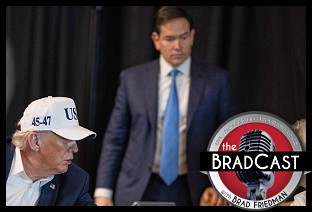 Trump Attacks Iran in 'Operation Epstein Fury': 'BradCast' 3/2/26
Trump Attacks Iran in 'Operation Epstein Fury': 'BradCast' 3/2/26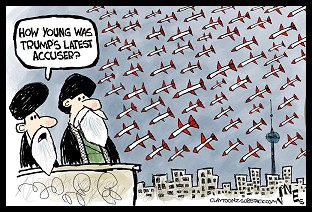 Sunday 'No, More Wars!' Toons
Sunday 'No, More Wars!' Toons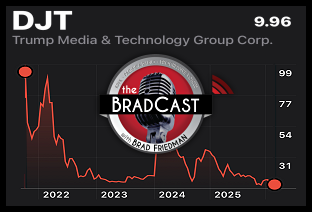 Loser Trump's Unlawful Tariffs, Failed Media Company, Corrupt SCOTUS: 'BradCast' 2/26/26
Loser Trump's Unlawful Tariffs, Failed Media Company, Corrupt SCOTUS: 'BradCast' 2/26/26 'Green News Report' 2/26/26
'Green News Report' 2/26/26 The State of the Union is ... Insane.
The State of the Union is ... Insane.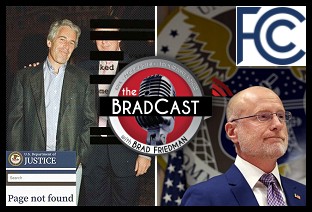 FCC's New 'Threat' to Broadcasters; NPR Confirms DOJ's 'Missing' Trump 'Rape' Docs: 'BradCast' 2/24/26
FCC's New 'Threat' to Broadcasters; NPR Confirms DOJ's 'Missing' Trump 'Rape' Docs: 'BradCast' 2/24/26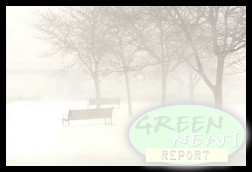 'Green News Report' 2/24/26
'Green News Report' 2/24/26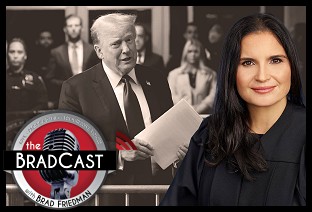 Aileen Cannon May be Covering Up Evidence of Trump Rape: 'BradCast' 2/23/26
Aileen Cannon May be Covering Up Evidence of Trump Rape: 'BradCast' 2/23/26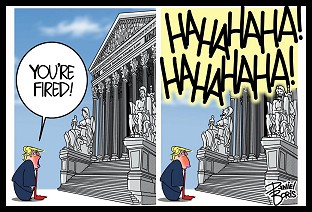 Sunday 'Plan B' Toons
Sunday 'Plan B' Toons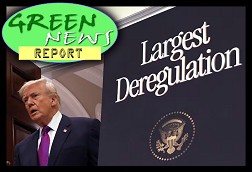 'Green News Report' 2/19/26
'Green News Report' 2/19/26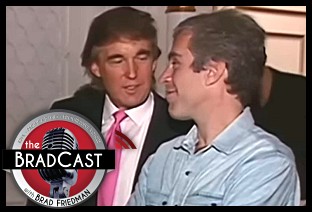 DOJ Hiding Evidence of Trump Rape, Assault Allegations: 'BradCast' 2/19/26
DOJ Hiding Evidence of Trump Rape, Assault Allegations: 'BradCast' 2/19/26 'No More Fig Leaves': Antisemitism Rising Inside MAGA, GOP: 'BradCast' 2/18/26
'No More Fig Leaves': Antisemitism Rising Inside MAGA, GOP: 'BradCast' 2/18/26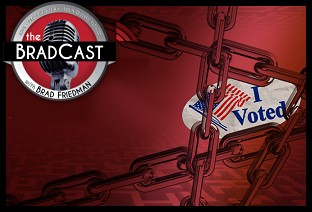 'SAVE America Act' Designed to Save GOP, Undermine Democracy: 'BradCast' 2/17/26
'SAVE America Act' Designed to Save GOP, Undermine Democracy: 'BradCast' 2/17/26 Court Blocks Hegseth Censure of Sen. Kelly
Court Blocks Hegseth Censure of Sen. Kelly Harpy Tantrums, Legal Losses, Election Fails, Retreating ICE: 'BradCast' 2/12/26
Harpy Tantrums, Legal Losses, Election Fails, Retreating ICE: 'BradCast' 2/12/26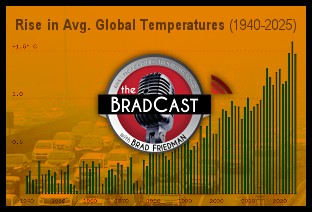 Trump to Reverse EPA's Landmark 'Endanger-ment Finding': 'BradCast' 2/11/26
Trump to Reverse EPA's Landmark 'Endanger-ment Finding': 'BradCast' 2/11/26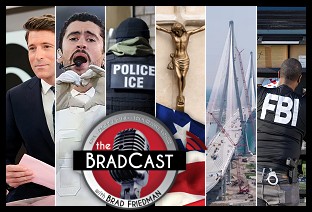 Trump's Racism, Corruption, 'Culture War': 'BradCast' 2/10/26
Trump's Racism, Corruption, 'Culture War': 'BradCast' 2/10/26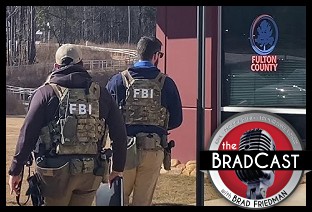 About Trump's FBI Raid of Fulton County, GA Election Hub: 'BradCast' 2/9/26
About Trump's FBI Raid of Fulton County, GA Election Hub: 'BradCast' 2/9/26
 VA GOP VOTER REG FRAUDSTER OFF HOOK
VA GOP VOTER REG FRAUDSTER OFF HOOK Criminal GOP Voter Registration Fraud Probe Expanding in VA
Criminal GOP Voter Registration Fraud Probe Expanding in VA DOJ PROBE SOUGHT AFTER VA ARREST
DOJ PROBE SOUGHT AFTER VA ARREST Arrest in VA: GOP Voter Reg Scandal Widens
Arrest in VA: GOP Voter Reg Scandal Widens ALL TOGETHER: ROVE, SPROUL, KOCHS, RNC
ALL TOGETHER: ROVE, SPROUL, KOCHS, RNC LATimes: RNC's 'Fired' Sproul Working for Repubs in 'as Many as 30 States'
LATimes: RNC's 'Fired' Sproul Working for Repubs in 'as Many as 30 States' 'Fired' Sproul Group 'Cloned', Still Working for Republicans in At Least 10 States
'Fired' Sproul Group 'Cloned', Still Working for Republicans in At Least 10 States FINALLY: FOX ON GOP REG FRAUD SCANDAL
FINALLY: FOX ON GOP REG FRAUD SCANDAL COLORADO FOLLOWS FLORIDA WITH GOP CRIMINAL INVESTIGATION
COLORADO FOLLOWS FLORIDA WITH GOP CRIMINAL INVESTIGATION CRIMINAL PROBE LAUNCHED INTO GOP VOTER REGISTRATION FRAUD SCANDAL IN FL
CRIMINAL PROBE LAUNCHED INTO GOP VOTER REGISTRATION FRAUD SCANDAL IN FL Brad Breaks PA Photo ID & GOP Registration Fraud Scandal News on Hartmann TV
Brad Breaks PA Photo ID & GOP Registration Fraud Scandal News on Hartmann TV  CAUGHT ON TAPE: COORDINATED NATIONWIDE GOP VOTER REG SCAM
CAUGHT ON TAPE: COORDINATED NATIONWIDE GOP VOTER REG SCAM CRIMINAL ELECTION FRAUD COMPLAINT FILED AGAINST GOP 'FRAUD' FIRM
CRIMINAL ELECTION FRAUD COMPLAINT FILED AGAINST GOP 'FRAUD' FIRM RICK SCOTT GETS ROLLED IN GOP REGISTRATION FRAUD SCANDAL
RICK SCOTT GETS ROLLED IN GOP REGISTRATION FRAUD SCANDAL VIDEO: Brad Breaks GOP Reg Fraud Scandal on Hartmann TV
VIDEO: Brad Breaks GOP Reg Fraud Scandal on Hartmann TV RNC FIRES NATIONAL VOTER REGISTRATION FIRM FOR FRAUD
RNC FIRES NATIONAL VOTER REGISTRATION FIRM FOR FRAUD EXCLUSIVE: Intvw w/ FL Official Who First Discovered GOP Reg Fraud
EXCLUSIVE: Intvw w/ FL Official Who First Discovered GOP Reg Fraud GOP REGISTRATION FRAUD FOUND IN FL
GOP REGISTRATION FRAUD FOUND IN FL

































